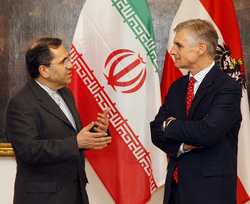| If you are the sort who enjoys banging your head against a wall or muttering to yourself, you might try wondering how a normal presidential campaign season would treat the news that U.S. officials flew $400 million in cash (foreign denominations only) to Iran at roughly the same time four American prisoners were released. Whatever the answer, it probably would be different than what actually happened Wednesday, when |
| | news cycles were dominated instead by Donald Trump’s failure to endorse either House Speaker Paul Ryan or Arizona Sen. John McCain in their re-election bids, despite their endorsement of him, of his ordering that a crying baby be removed from a room (perhaps only in jest, who knows?), and of his vague concerns that the election might be rigged. By Wednesday afternoon, the cash payment had gotten Trump’s attention. He responded predictably by blaming Hillary Clinton for it. She resigned as secretary of state in 2013. The payment was made in January of this year. My point isn’t to play favorites in a presidential year when no candidate seems appealing. Clinton hasn’t exactly taken pains to elevate discussions, either. Rather, the point is that serious foreign policy questions will confront whoever occupies the White House on Jan. 20, and yet we’re engulfed in irrelevant and childish prattle. The Obama administration insists the $400 million was not ransom, even though Iranian officials are not shy about calling it that. “Ransom” is a loaded word for a government. It can lead to more hostage-taking, especially when the wealthiest nation on earth is paying. So, was Obama’s policy of engagement with a repressive enemy wise, and was the nuclear deal it produced effective or just another failed attempt to extract concessions from an untrustworthy foe? If unwise, then what would be a better alternative for dealing with Iran or any other troubling regime? What should be done about Venezuela, an oil-rich nation teetering on the brink of economic disaster, where a general who has been indicted by a U.S. court on drug charges was just named foreign minister? How does the United States contain North Korea? What is the best way to destroy ISIS while protecting the homeland? Was it wise to relax travel restrictions to Cuba at a time when dissidents remain imprisoned? These are substantive questions. But suggest they take center stage and you feel like a student coaxing classmates to behave when the teacher has stepped out and spit wads fill the air. Believe it or not, the candidates have positions on many of these issues, but without a robust debate, these won’t be clarified or refined, and voters won’t understand them. I’m guessing the official debates this fall won’t help matters much, either. Only four years ago, former presidents George W. Bush and Bill Clinton spoke at a conference in Salt Lake City about the need for greater civility in Washington and elsewhere. Clinton was under fire for having made a mildly positive comment about Mitt Romney on CNN. That seems as quaint today as some Broadway production portraying distant American political history. Was it really four years ago or some time in the Gilded Age? 2012 is as relevant to this year’s campaign as Mary Poppins was to the actual life of a chimney sweep in 19th century London. Students of political science have long viewed Lyndon Johnson’s “Daisy” ad in 1964 as a great example of effective negative advertising. It portrayed Barry Goldwater as someone who might ignite a nuclear war without ever mentioning his name. It was subtle, effective, years ahead of its time, and also unfair. But at least it concerned an important question during a dangerous part of the Cold War. This year, personal attacks have all the subtlety of the ice bucket challenge — if the point was to throw buckets of ice on other people. In the past, the character question was just that – one question out of many in a race where combatants tried to look presidential. This year it isn’t really a question, but an accusation, and it is swallowing all other questions whole. We may regret this next year when whoever lives at 1600 Pennsylvania Avenue deals with the real complexities of a dangerous world. |


 RSS Feed
RSS Feed

